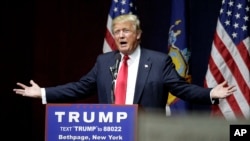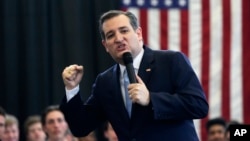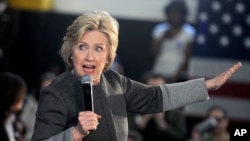After a rocky week of campaigning featuring a double-digit primary loss and an unexpected battle over qualifications, Republican and Democratic presidential candidates are rushing to claim delegate-rich New York as their own heading into the state’s April 19 primary. The state awards 95 delegates on the Republican side and 291 delegates on the Democratic side.
Frontrunner businessman Donald Trump heads into New York after the first major primary loss of his campaign in Wisconsin this week, securing 35 percent of the vote to winner Ted Cruz’ 48 percent.
Trump has been a media star in New York City for decades and has a double-digit lead over Texas Senator Ted Cruz in advance polling. But his loss in Wisconsin exposes deeper problems in his campaign. A new Associated Press-GFK poll released this week shows Trump is viewed unfavorably by 7 out of 10 Americans, including half of Republican voters. The poll found dislike for Trump is common to Americans of all races, genders and geographic locations, raising key questions about his viability in a general election.
Analysts say Trump still has a viable path to winning the nomination since 36 percent of the total delegates are still to be won. Trump would need to win 63 percent of those delegates in primary votes to outright secure the nomination while Ted Cruz needs an almost 97 percent to win.
Trump hires veteran consultant
Trump's loss in Wisconsin appears to increase the likelihood of a contested nomination. The Trump campaign is focusing on building a strategy heading into the Republican convention this summer in Cleveland. This week, Trump hired Paul Manafort, a longtime political veteran, to manage the increasingly complicated battle for convention delegates.
“The campaign has now gotten to the point where how you win and where you win does matter and then protecting what you won,” Manafort told the New York Times in a phone interview Thursday.
Cruz has argued throughout the campaign that he is the only viable candidate in a general election but the demographics of upcoming votes in liberal northeastern states don’t play to his campaign’s strengths.
Cruz didn’t back down from comments earlier in the campaign when he attacked Donald Trump for his “New York values.”
“Everyone in New York and outside of New York knows exactly what I meant by that,” Cruz told CNN Thursday. “And it is the liberal values of Democratic politicians who have been hammering the people of New York for decades."
Cruz is relying on a long term strategy on the ground in primary states, monitoring the obscure rules and regulations that govern party delegates and the nomination process.
Ohio governor John Kasich – who has already been mathematically eliminated from winning enough delegates to secure the nomination – continued his fight to take his candidacy all the way to Cleveland, holding a town hall event in Syracuse, New York Friday.
Democrats turn negative
An April 7 McClatchy/Marist poll shows former secretary of state Hillary Clinton beating Trump 51 to 40 but tying in a head to head matchup with Ted Cruz with 47 percent of the vote, while Vermont Senator Sanders beats all three remaining Republican challengers in a general election contest.
Sanders looks to build on momentum from winning six out of the last seven primary contests, although he still significantly trails Clinton in overall delegate totals. Clinton has not mathematically eliminated Sanders from contention but she holds a commanding lead of 1,749 delegates over the 1,061 awarded to Sanders.
Both Clinton and Sanders claim New York as home ground – Brooklyn-born Sanders set up a campaign office there, just blocks from the campaign headquarters of Hillary Clinton, who represented the state of New York as a senator.
In a sign Wednesday that the battle for New York’s Democratic primary delegates may move closer to the consistently nasty tone of the Republican field, Sanders said Clinton was “not qualified” to be president because of her vote in support of the Iraq war and willingness to accept Wall Street money. Sanders – who has previously resisted opportunities to campaign negatively against Clinton – faced sharp criticism online for his words. Clinton supporters took to social media under the hashtag #ClintonSoQualified to note Clinton’s years of experience as first lady, New York senator and secretary of state.
President Barack Obama has refrained from getting involved in the Democratic presidential primary until now but appeared to comment Thursday on the intensified battle between Clinton and Sanders.
In a Chicago town-hall meeting with law students, Obama warned against Democrats developing a “Tea Party mentality” and fighting against each other at the expense of party unity.
“I don’t see that being where the Democrats go, but it’s always something we have to pay attention to.”
The pace of voting has significantly slowed since large numbers of delegates were awarded in state primary votes in February and March. Wyoming holds a Democratic caucus ten days before the New York Primary vote, on April 9.







